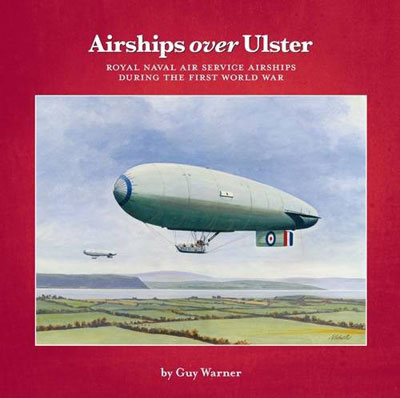 Bangor Historical Society met on 13 November 2014 for a talk by Guy Warner. His subject was Airships over the North Channel. He is a member of the Ulster Aviation Society and has written a number of books on aircraft.
Bangor Historical Society met on 13 November 2014 for a talk by Guy Warner. His subject was Airships over the North Channel. He is a member of the Ulster Aviation Society and has written a number of books on aircraft.
He began his talk with a photograph of his grandparents and explained that his grandfather was a Marconi-trained wireless operator from England. During the First World War he served in the Royal Naval Reserve and was later stationed in Larne. He stayed there after the war and married a local girl.
During the First World War there was an airship station at Bentra at Whitehead and another one at Luce Bay on the Scottish coast. Larne was important because of its position on the North Channel and more than 200 small vessels were stationed there. One of their tasks was to maintain the submarine nets, part of the defences against German U-boats.
By 1915 there was stalemate on the western front and the Germans tried to break it by declaring the waters around the British Isles a war zone. Here they would destroy all enemy vessels without warning. In 1915 the Lusitania was sunk off the southern Irish coast. This led to protests from USA as some of her citizens were among the dead. The admiralty was now looking for a way to protect the coast from the air and airships provided an answer. They could search for submarines in enclosed areas while keeping on station for up to eight hours with two crewmen. In addition they could carry guns and were of a simple design, quick to produce.
The airships consisted of a gas bag filled with hydrogen and the fuselage of an aircraft slung below the bag. They were flown by young midshipmen from the navy. The base at Luce Bay was built first and had a 300’ long airship shed which could house four of the craft. Similar facilities were set up at Bentra in the autumn of 1915. The main task of the airships was to look for submarines on the surface. When one was spotted they called in the navy to tackle it. The airships also had a deterrent effect – when a submarine saw one it would dive below the surface and escape, but would use more battery power and move at a slower speed. They could also spot German minefields and explode them by firing on them.
As the war progressed airship design improved and there were more patrols. The convoy system was important in protecting merchant ships, but the airship patrols also played a vital part. When the war ended the base at Bentra was no longer needed and the land returned to farming.
Paul McKay proposed the vote of thanks to the speaker for a fascinating talk. Brian Wilson of the Friends of Columbanus then explained about the weekend of events the society was organising. The next meeting of the Historical Society will be held on December 11 at 8pm in the Good Templar Hall on Hamilton Road, Bangor. The speaker will be Liam Logan with a look at Ulster Scots.
